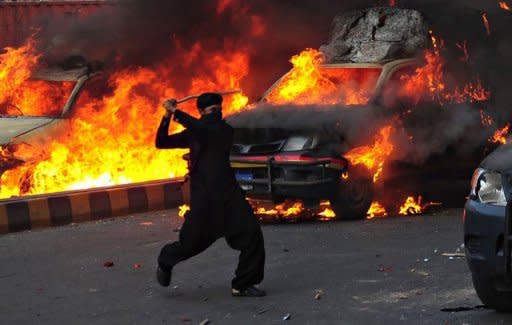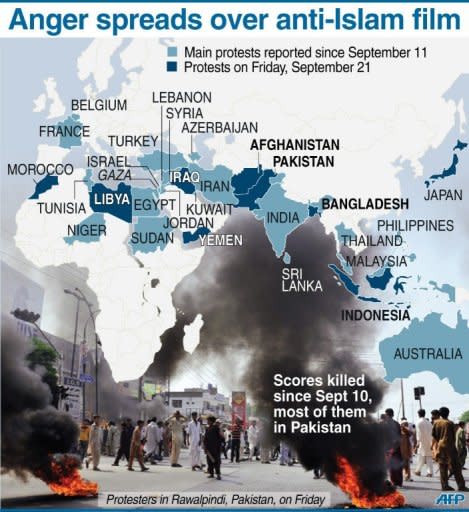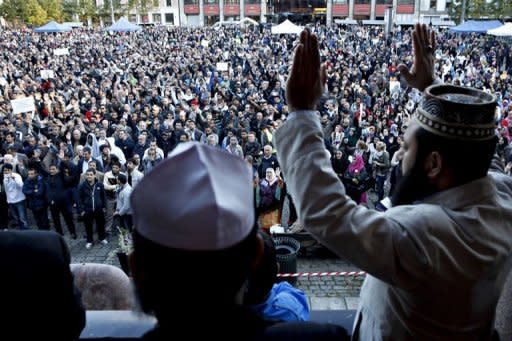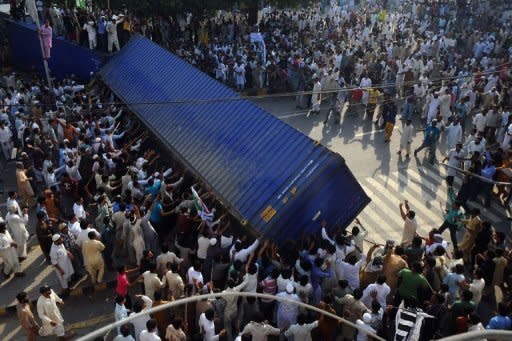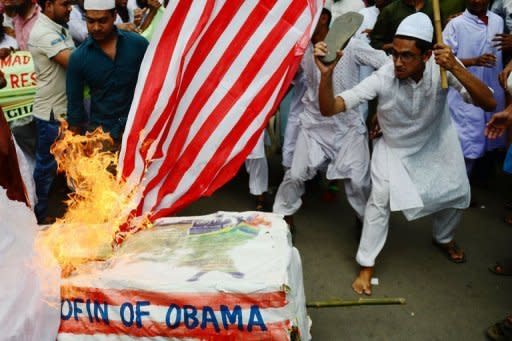17 dead in fresh film protests across Muslim world
Violent demonstrations in Pakistan left at least 17 people dead and hundreds injured on Friday as fresh protests erupted across the Muslim world against a US-made film and French cartoons mocking Islam. In Middle Eastern and Asian countries tens of thousands took to the streets after the main weekly prayers to vent their anger, with little sign that the angry protests, which began last week, would abate. Western missions were shut across the Islamic world, fearing a further escalation of the backlash over the low-budget film "Innocence of Muslims" that has spread across the world. France, where a magazine this week published a series of cartoons mocking the Prophet Mohammed, has shut embassies, consulates, cultural centres and schools in 20 Muslim countries, fearing the fury will spread from US targets. In Benghazi, Libya, a rally of hundreds of radical Salafists was drowned out by some 30,000 residents demonstrating against the influence of militias in the eastern city. Hundreds of protesters stormed the base of hardline Salafist jihadi group Ansar al-Sharia Islamist militia, forcing the group to flee and then setting fire to the military compound. Pakistan bore the brunt of the anger Friday, with huge crowds of demonstrators throwing stones and setting buildings ablaze to denounce the film. Twelve people were killed in Karachi, the country's largest city, and five in the northwestern city of Peshawar, hospital officials said. Demonstrators defied a government call for only peaceful rallies on what was declared a national holiday in honour of Mohammed. The combined total of wounded in Karachi, Peshawar and in the capital Islamabad was 229. Witnesses estimated that nationwide rallies mobilised more than 45,000, mainly members of right-wing religious parties and supporters of banned terror groups, although the numbers were still small in a country of 180 million. Police fought back with gunshots and tear gas as arsonists and looters attacked cinemas, banks, shops and restaurants in Karachi, where outbreaks of political and ethnically linked violence have killed hundreds this year. Two cinemas were also torched and ransacked in the northwestern city of Peshawar, on the edge of tribal belt strongholds of the Taliban and Al-Qaeda. In Karachi, a policeman who died after being shot when officers used tear gas to disperse a crowd near the US consulate was among the 12 people killed in the country's largest city. The five dead in Peshawar include the driver for a TV channel, which blamed police for his death. Police and paramilitary troops fired volleys of tear gas to hold off protesters from breaching barricades that sealed access to Western embassies and consulates. Overall, 19 people have been killed in Pakistan during protests over the past week. In Islamabad gunshots were fired outside the five-star Serena Hotel and police baton-charged some 8,000 protesters trying to penetrate the heavily guarded diplomatic enclave. Protestors threw stones, shouting "Americans are dogs" and "Friends of America are traitors", while setting fire to an effigy of a nameless American. The government had declared Friday a "day of love for the prophet", but for hours shut down mobile telephone networks in an apparent bid to prevent extremists from exploiting the protests to carry out bomb attacks. "It is our collective responsibility to protest peacefully without causing harm or damage to life or property," said Prime Minister Raja Pervez Ashraf as shops, markets and petrol stations shut en masse. Washington has warned citizens not to travel to Pakistan and spent $70,000 to air TV adverts in the country disassociating the US government from the film, made by extremist Christians in the United States. US Secretary of State Hillary Clinton on Friday reminded governments of their "solemn duty" to protect diplomatic missions, saying that "they must be safe and protected places". In other Muslim countries, the protests were largely peaceful. Sunnis and Shiites took to the streets of Lebanon, and there were also demonstrations in Basra in south Iraq and in the Yemeni capital Sanaa. Tunisia banned all demonstrations amid fears of violence. In Libya's second city Benghazi hundreds of radical Salafists protested over the film and cartoons. The jihadist group Ansar al-Sharia called the demonstration. But their demonstration was overwhelmed by tens of thousands rallying against the overweaning presence of the militias in Benghazi, who called for the Tripoli authorities to bring the armed groups under control. Banners paid tribute to US ambassador Chris Stevens, who was killed along with three other Americans on September 11 in what US Secretary of State Hillary Clinton, for the first time Friday, called "a terrorist attack" on the US mission in Benghazi. There were also demonstrations across Asia in Indonesia, Malaysia, Japan and Bangladesh, where about 10,000 took to the streets of Dhaka to condemn the film and the French cartoons. Around a hundred Muslim protesters gathered outside the French embassy in London, while in German cities hundreds held peaceful protests against the US-made film, which depicts Mohammed as a thuggish sexual deviant. After French satirical weekly Charlie Hebdo printed cartoons caricaturing the founder of Islam, the French government said it would deny requests to protest against the film. The magazine's editor, Stephane Charbonnier, mocked those angered by the cartoons as "ridiculous clowns" and accused the French government of pandering to them by criticising the magazine for being provocative.

